Annotated Bibliography: Human Resource Theory and Practice - MGN440
VerifiedAdded on 2022/08/19
|9
|2008
|7
Homework Assignment
AI Summary
This annotated bibliography, prepared by a student, provides an in-depth analysis of three journal articles related to human resource management (HRM). The first annotation examines the relationship between HRM activities and the development of sustainable business organizations, emphasizing the importance of incorporating sustainability into HRM practices to ensure employee health, talent retention, and social responsibility. The second annotation focuses on the link between effective HRM and employee well-being, highlighting the need for an analytic framework that balances organizational interests with employee concerns to improve overall performance and productivity. The third annotation explores the evolution of HRM towards sustainability, contrasting strategic HRM with a more comprehensive approach that considers financial, organizational, and social outcomes, aligning employee interests with those of the organization. Each annotation includes a summary of the article's main arguments, an evaluation of its contributions, and a reflection on how the source can aid in understanding strategic and sustainable HRM, as well as decent work principles. The bibliography underscores the importance of sustainable HRM practices in fostering positive employer-employee relationships and improving overall business outcomes.
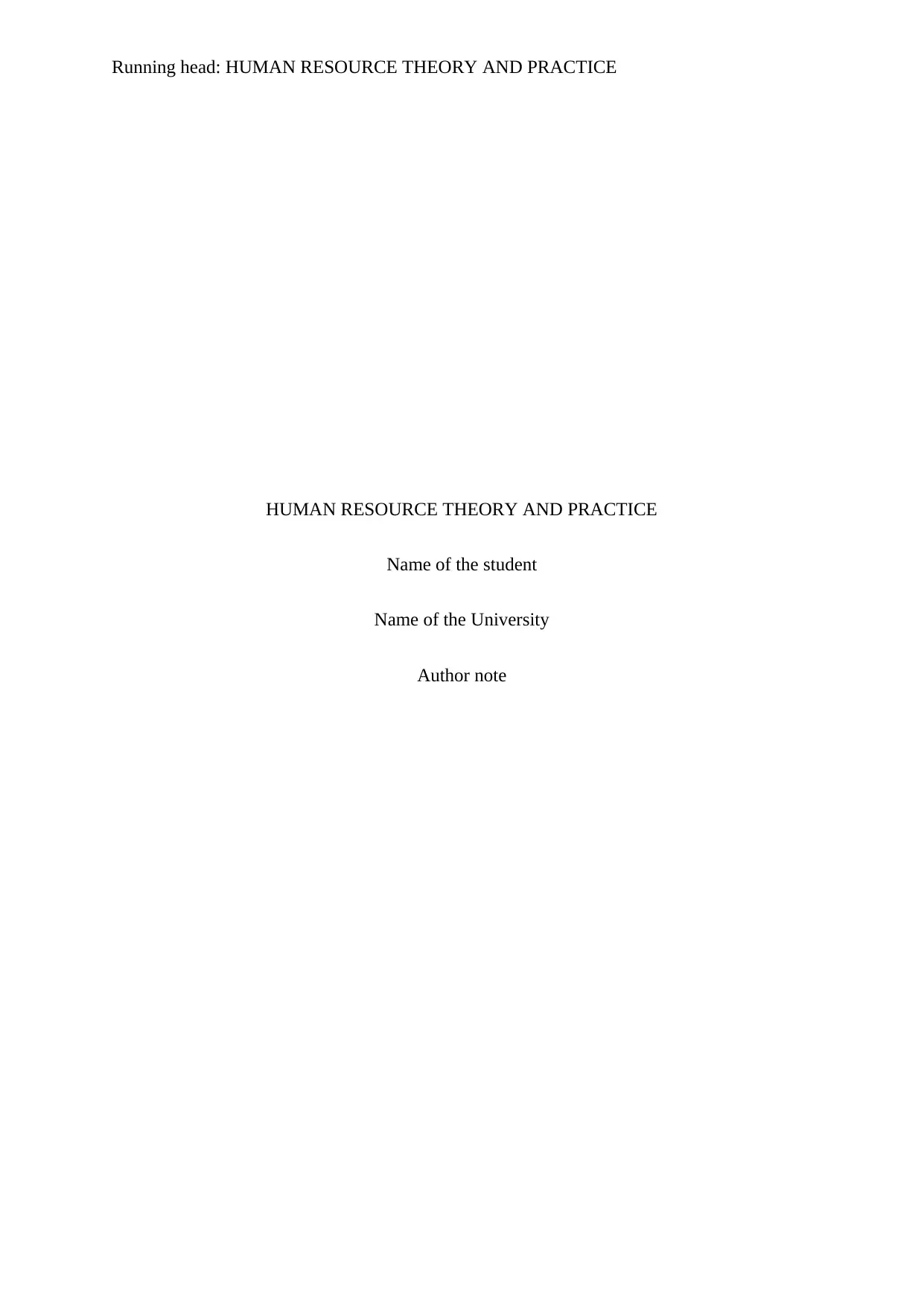
Running head: HUMAN RESOURCE THEORY AND PRACTICE
HUMAN RESOURCE THEORY AND PRACTICE
Name of the student
Name of the University
Author note
HUMAN RESOURCE THEORY AND PRACTICE
Name of the student
Name of the University
Author note
Paraphrase This Document
Need a fresh take? Get an instant paraphrase of this document with our AI Paraphraser
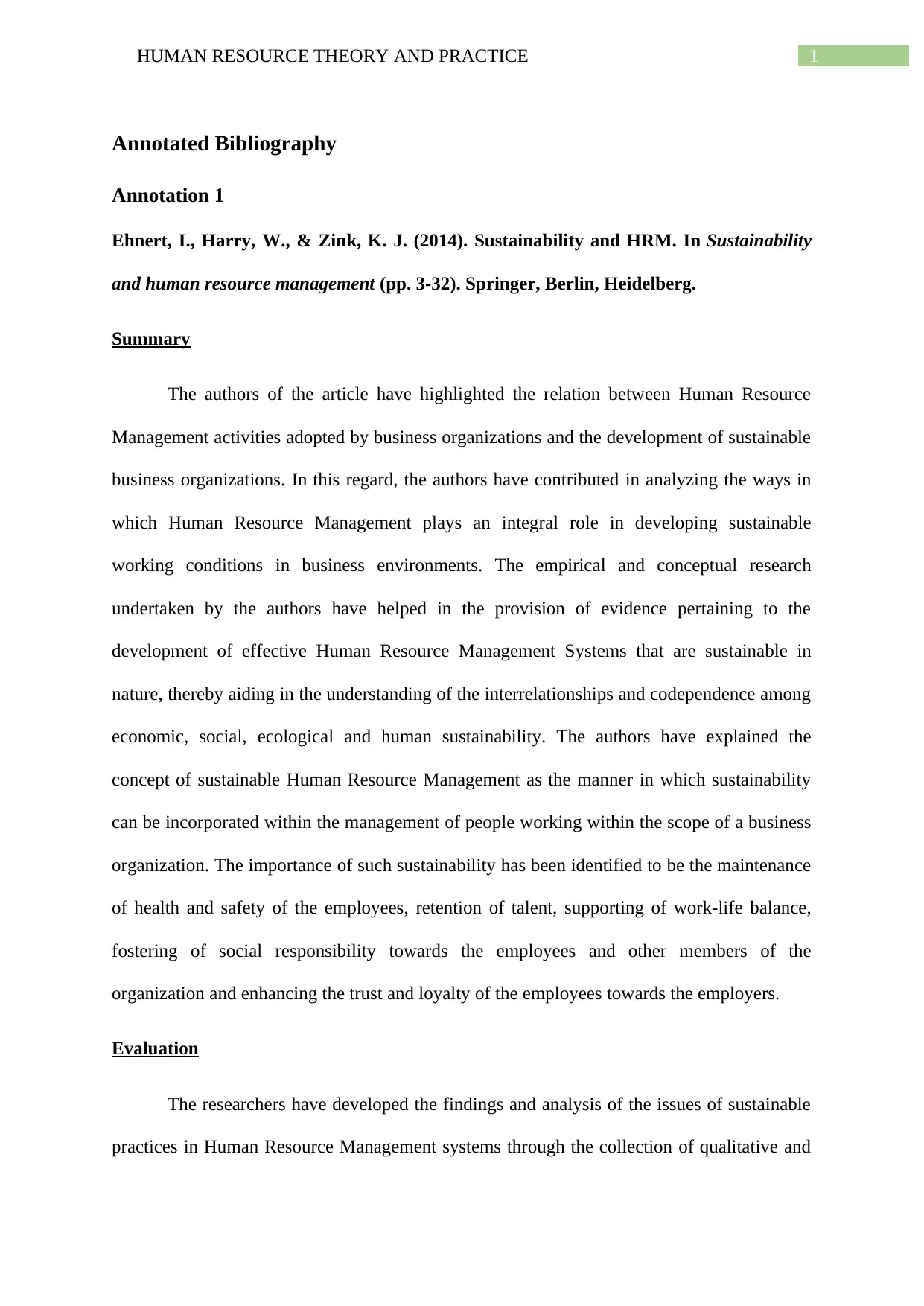
1HUMAN RESOURCE THEORY AND PRACTICE
Annotated Bibliography
Annotation 1
Ehnert, I., Harry, W., & Zink, K. J. (2014). Sustainability and HRM. In Sustainability
and human resource management (pp. 3-32). Springer, Berlin, Heidelberg.
Summary
The authors of the article have highlighted the relation between Human Resource
Management activities adopted by business organizations and the development of sustainable
business organizations. In this regard, the authors have contributed in analyzing the ways in
which Human Resource Management plays an integral role in developing sustainable
working conditions in business environments. The empirical and conceptual research
undertaken by the authors have helped in the provision of evidence pertaining to the
development of effective Human Resource Management Systems that are sustainable in
nature, thereby aiding in the understanding of the interrelationships and codependence among
economic, social, ecological and human sustainability. The authors have explained the
concept of sustainable Human Resource Management as the manner in which sustainability
can be incorporated within the management of people working within the scope of a business
organization. The importance of such sustainability has been identified to be the maintenance
of health and safety of the employees, retention of talent, supporting of work-life balance,
fostering of social responsibility towards the employees and other members of the
organization and enhancing the trust and loyalty of the employees towards the employers.
Evaluation
The researchers have developed the findings and analysis of the issues of sustainable
practices in Human Resource Management systems through the collection of qualitative and
Annotated Bibliography
Annotation 1
Ehnert, I., Harry, W., & Zink, K. J. (2014). Sustainability and HRM. In Sustainability
and human resource management (pp. 3-32). Springer, Berlin, Heidelberg.
Summary
The authors of the article have highlighted the relation between Human Resource
Management activities adopted by business organizations and the development of sustainable
business organizations. In this regard, the authors have contributed in analyzing the ways in
which Human Resource Management plays an integral role in developing sustainable
working conditions in business environments. The empirical and conceptual research
undertaken by the authors have helped in the provision of evidence pertaining to the
development of effective Human Resource Management Systems that are sustainable in
nature, thereby aiding in the understanding of the interrelationships and codependence among
economic, social, ecological and human sustainability. The authors have explained the
concept of sustainable Human Resource Management as the manner in which sustainability
can be incorporated within the management of people working within the scope of a business
organization. The importance of such sustainability has been identified to be the maintenance
of health and safety of the employees, retention of talent, supporting of work-life balance,
fostering of social responsibility towards the employees and other members of the
organization and enhancing the trust and loyalty of the employees towards the employers.
Evaluation
The researchers have developed the findings and analysis of the issues of sustainable
practices in Human Resource Management systems through the collection of qualitative and
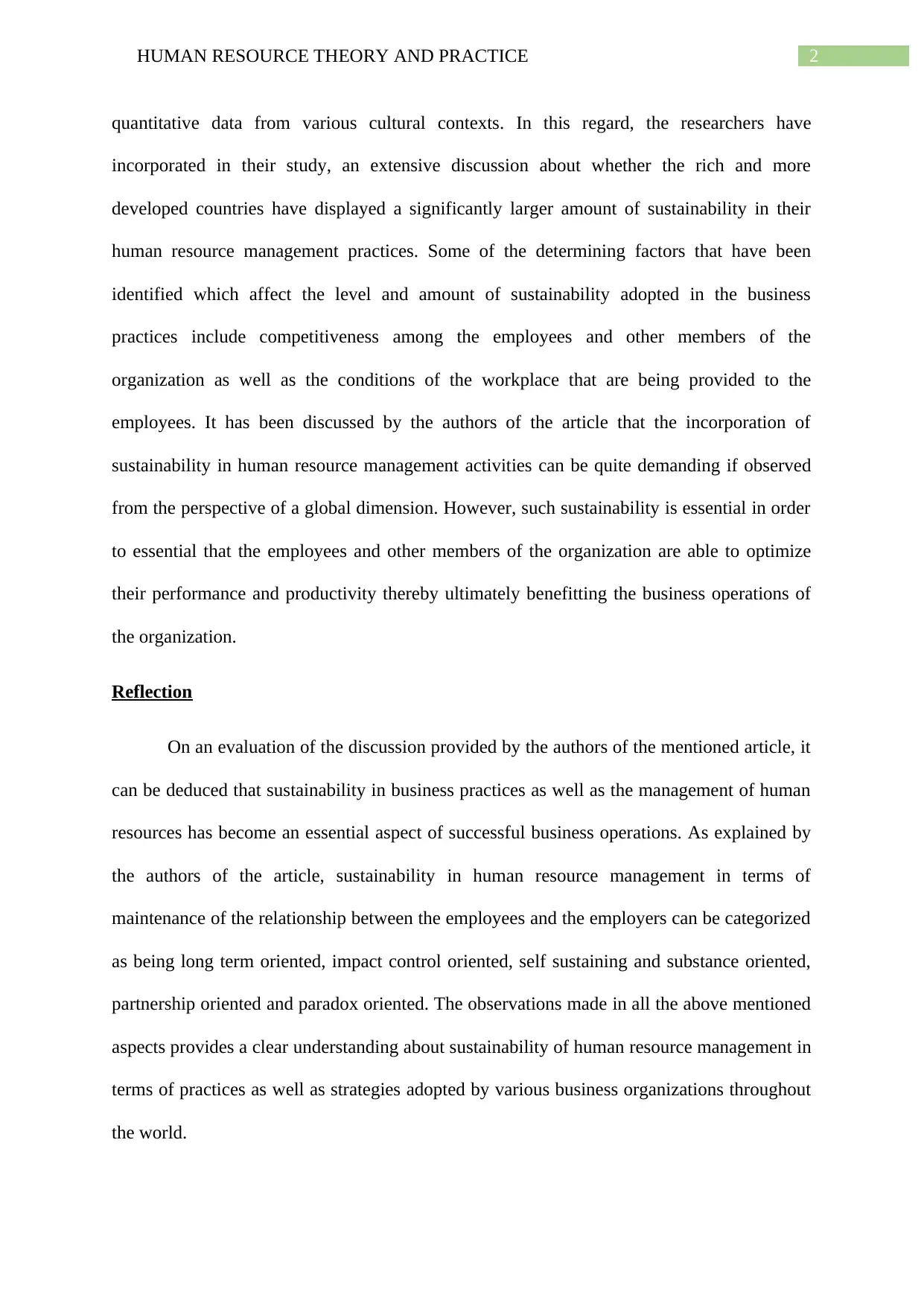
2HUMAN RESOURCE THEORY AND PRACTICE
quantitative data from various cultural contexts. In this regard, the researchers have
incorporated in their study, an extensive discussion about whether the rich and more
developed countries have displayed a significantly larger amount of sustainability in their
human resource management practices. Some of the determining factors that have been
identified which affect the level and amount of sustainability adopted in the business
practices include competitiveness among the employees and other members of the
organization as well as the conditions of the workplace that are being provided to the
employees. It has been discussed by the authors of the article that the incorporation of
sustainability in human resource management activities can be quite demanding if observed
from the perspective of a global dimension. However, such sustainability is essential in order
to essential that the employees and other members of the organization are able to optimize
their performance and productivity thereby ultimately benefitting the business operations of
the organization.
Reflection
On an evaluation of the discussion provided by the authors of the mentioned article, it
can be deduced that sustainability in business practices as well as the management of human
resources has become an essential aspect of successful business operations. As explained by
the authors of the article, sustainability in human resource management in terms of
maintenance of the relationship between the employees and the employers can be categorized
as being long term oriented, impact control oriented, self sustaining and substance oriented,
partnership oriented and paradox oriented. The observations made in all the above mentioned
aspects provides a clear understanding about sustainability of human resource management in
terms of practices as well as strategies adopted by various business organizations throughout
the world.
quantitative data from various cultural contexts. In this regard, the researchers have
incorporated in their study, an extensive discussion about whether the rich and more
developed countries have displayed a significantly larger amount of sustainability in their
human resource management practices. Some of the determining factors that have been
identified which affect the level and amount of sustainability adopted in the business
practices include competitiveness among the employees and other members of the
organization as well as the conditions of the workplace that are being provided to the
employees. It has been discussed by the authors of the article that the incorporation of
sustainability in human resource management activities can be quite demanding if observed
from the perspective of a global dimension. However, such sustainability is essential in order
to essential that the employees and other members of the organization are able to optimize
their performance and productivity thereby ultimately benefitting the business operations of
the organization.
Reflection
On an evaluation of the discussion provided by the authors of the mentioned article, it
can be deduced that sustainability in business practices as well as the management of human
resources has become an essential aspect of successful business operations. As explained by
the authors of the article, sustainability in human resource management in terms of
maintenance of the relationship between the employees and the employers can be categorized
as being long term oriented, impact control oriented, self sustaining and substance oriented,
partnership oriented and paradox oriented. The observations made in all the above mentioned
aspects provides a clear understanding about sustainability of human resource management in
terms of practices as well as strategies adopted by various business organizations throughout
the world.
⊘ This is a preview!⊘
Do you want full access?
Subscribe today to unlock all pages.

Trusted by 1+ million students worldwide
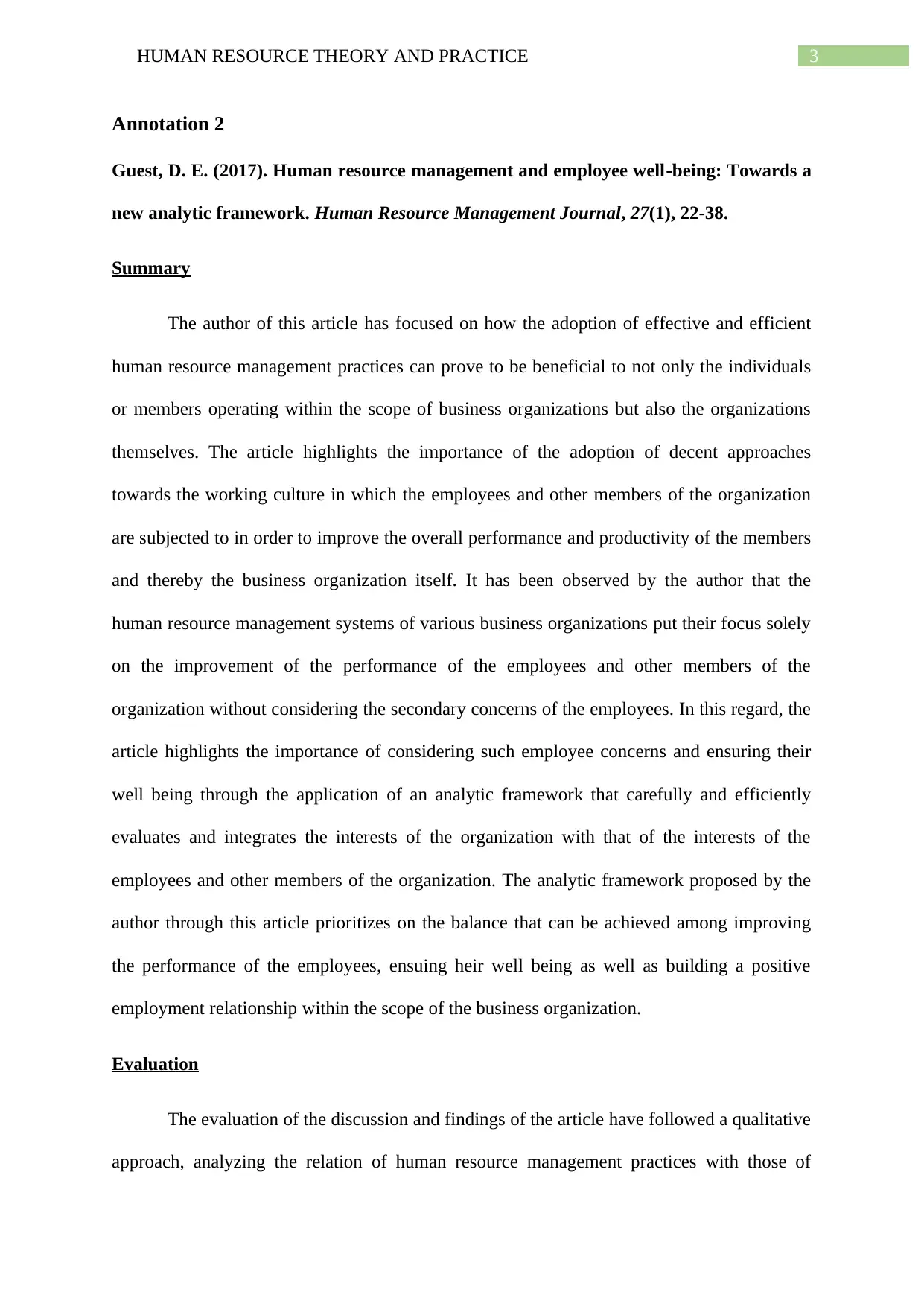
3HUMAN RESOURCE THEORY AND PRACTICE
Annotation 2
Guest, D. E. (2017). Human resource management and employee well‐being: Towards a
new analytic framework. Human Resource Management Journal, 27(1), 22-38.
Summary
The author of this article has focused on how the adoption of effective and efficient
human resource management practices can prove to be beneficial to not only the individuals
or members operating within the scope of business organizations but also the organizations
themselves. The article highlights the importance of the adoption of decent approaches
towards the working culture in which the employees and other members of the organization
are subjected to in order to improve the overall performance and productivity of the members
and thereby the business organization itself. It has been observed by the author that the
human resource management systems of various business organizations put their focus solely
on the improvement of the performance of the employees and other members of the
organization without considering the secondary concerns of the employees. In this regard, the
article highlights the importance of considering such employee concerns and ensuring their
well being through the application of an analytic framework that carefully and efficiently
evaluates and integrates the interests of the organization with that of the interests of the
employees and other members of the organization. The analytic framework proposed by the
author through this article prioritizes on the balance that can be achieved among improving
the performance of the employees, ensuing heir well being as well as building a positive
employment relationship within the scope of the business organization.
Evaluation
The evaluation of the discussion and findings of the article have followed a qualitative
approach, analyzing the relation of human resource management practices with those of
Annotation 2
Guest, D. E. (2017). Human resource management and employee well‐being: Towards a
new analytic framework. Human Resource Management Journal, 27(1), 22-38.
Summary
The author of this article has focused on how the adoption of effective and efficient
human resource management practices can prove to be beneficial to not only the individuals
or members operating within the scope of business organizations but also the organizations
themselves. The article highlights the importance of the adoption of decent approaches
towards the working culture in which the employees and other members of the organization
are subjected to in order to improve the overall performance and productivity of the members
and thereby the business organization itself. It has been observed by the author that the
human resource management systems of various business organizations put their focus solely
on the improvement of the performance of the employees and other members of the
organization without considering the secondary concerns of the employees. In this regard, the
article highlights the importance of considering such employee concerns and ensuring their
well being through the application of an analytic framework that carefully and efficiently
evaluates and integrates the interests of the organization with that of the interests of the
employees and other members of the organization. The analytic framework proposed by the
author through this article prioritizes on the balance that can be achieved among improving
the performance of the employees, ensuing heir well being as well as building a positive
employment relationship within the scope of the business organization.
Evaluation
The evaluation of the discussion and findings of the article have followed a qualitative
approach, analyzing the relation of human resource management practices with those of
Paraphrase This Document
Need a fresh take? Get an instant paraphrase of this document with our AI Paraphraser
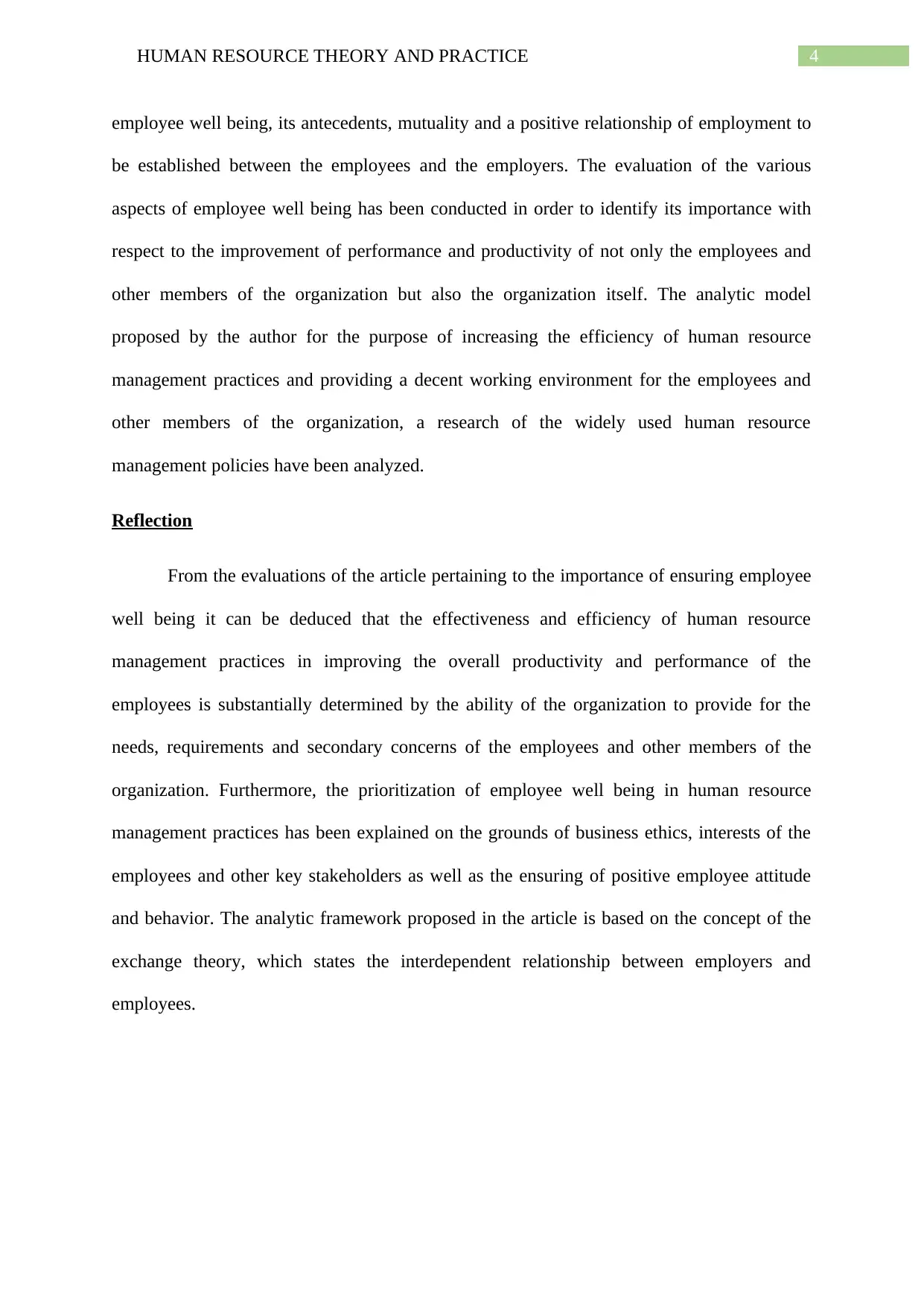
4HUMAN RESOURCE THEORY AND PRACTICE
employee well being, its antecedents, mutuality and a positive relationship of employment to
be established between the employees and the employers. The evaluation of the various
aspects of employee well being has been conducted in order to identify its importance with
respect to the improvement of performance and productivity of not only the employees and
other members of the organization but also the organization itself. The analytic model
proposed by the author for the purpose of increasing the efficiency of human resource
management practices and providing a decent working environment for the employees and
other members of the organization, a research of the widely used human resource
management policies have been analyzed.
Reflection
From the evaluations of the article pertaining to the importance of ensuring employee
well being it can be deduced that the effectiveness and efficiency of human resource
management practices in improving the overall productivity and performance of the
employees is substantially determined by the ability of the organization to provide for the
needs, requirements and secondary concerns of the employees and other members of the
organization. Furthermore, the prioritization of employee well being in human resource
management practices has been explained on the grounds of business ethics, interests of the
employees and other key stakeholders as well as the ensuring of positive employee attitude
and behavior. The analytic framework proposed in the article is based on the concept of the
exchange theory, which states the interdependent relationship between employers and
employees.
employee well being, its antecedents, mutuality and a positive relationship of employment to
be established between the employees and the employers. The evaluation of the various
aspects of employee well being has been conducted in order to identify its importance with
respect to the improvement of performance and productivity of not only the employees and
other members of the organization but also the organization itself. The analytic model
proposed by the author for the purpose of increasing the efficiency of human resource
management practices and providing a decent working environment for the employees and
other members of the organization, a research of the widely used human resource
management policies have been analyzed.
Reflection
From the evaluations of the article pertaining to the importance of ensuring employee
well being it can be deduced that the effectiveness and efficiency of human resource
management practices in improving the overall productivity and performance of the
employees is substantially determined by the ability of the organization to provide for the
needs, requirements and secondary concerns of the employees and other members of the
organization. Furthermore, the prioritization of employee well being in human resource
management practices has been explained on the grounds of business ethics, interests of the
employees and other key stakeholders as well as the ensuring of positive employee attitude
and behavior. The analytic framework proposed in the article is based on the concept of the
exchange theory, which states the interdependent relationship between employers and
employees.
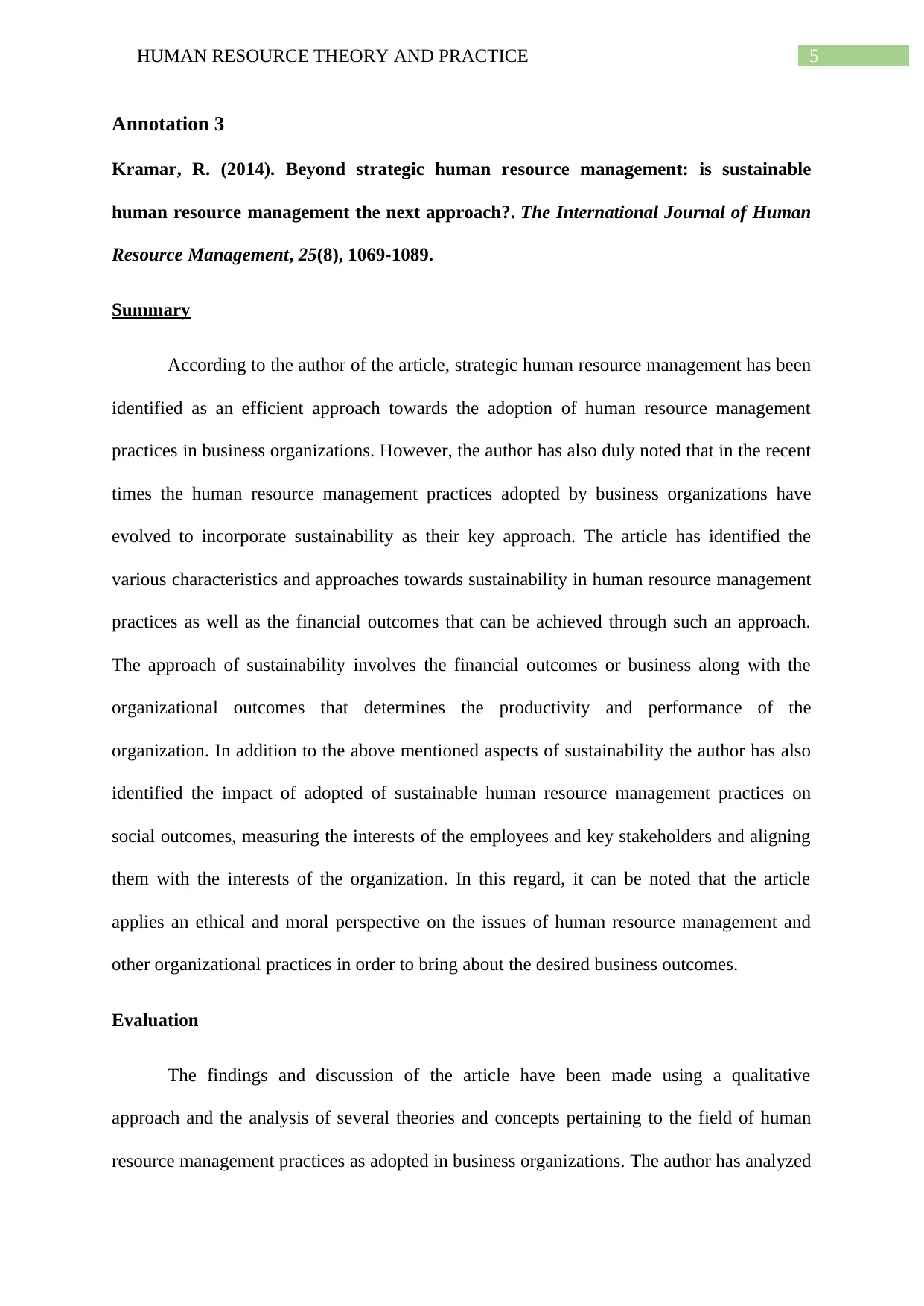
5HUMAN RESOURCE THEORY AND PRACTICE
Annotation 3
Kramar, R. (2014). Beyond strategic human resource management: is sustainable
human resource management the next approach?. The International Journal of Human
Resource Management, 25(8), 1069-1089.
Summary
According to the author of the article, strategic human resource management has been
identified as an efficient approach towards the adoption of human resource management
practices in business organizations. However, the author has also duly noted that in the recent
times the human resource management practices adopted by business organizations have
evolved to incorporate sustainability as their key approach. The article has identified the
various characteristics and approaches towards sustainability in human resource management
practices as well as the financial outcomes that can be achieved through such an approach.
The approach of sustainability involves the financial outcomes or business along with the
organizational outcomes that determines the productivity and performance of the
organization. In addition to the above mentioned aspects of sustainability the author has also
identified the impact of adopted of sustainable human resource management practices on
social outcomes, measuring the interests of the employees and key stakeholders and aligning
them with the interests of the organization. In this regard, it can be noted that the article
applies an ethical and moral perspective on the issues of human resource management and
other organizational practices in order to bring about the desired business outcomes.
Evaluation
The findings and discussion of the article have been made using a qualitative
approach and the analysis of several theories and concepts pertaining to the field of human
resource management practices as adopted in business organizations. The author has analyzed
Annotation 3
Kramar, R. (2014). Beyond strategic human resource management: is sustainable
human resource management the next approach?. The International Journal of Human
Resource Management, 25(8), 1069-1089.
Summary
According to the author of the article, strategic human resource management has been
identified as an efficient approach towards the adoption of human resource management
practices in business organizations. However, the author has also duly noted that in the recent
times the human resource management practices adopted by business organizations have
evolved to incorporate sustainability as their key approach. The article has identified the
various characteristics and approaches towards sustainability in human resource management
practices as well as the financial outcomes that can be achieved through such an approach.
The approach of sustainability involves the financial outcomes or business along with the
organizational outcomes that determines the productivity and performance of the
organization. In addition to the above mentioned aspects of sustainability the author has also
identified the impact of adopted of sustainable human resource management practices on
social outcomes, measuring the interests of the employees and key stakeholders and aligning
them with the interests of the organization. In this regard, it can be noted that the article
applies an ethical and moral perspective on the issues of human resource management and
other organizational practices in order to bring about the desired business outcomes.
Evaluation
The findings and discussion of the article have been made using a qualitative
approach and the analysis of several theories and concepts pertaining to the field of human
resource management practices as adopted in business organizations. The author has analyzed
⊘ This is a preview!⊘
Do you want full access?
Subscribe today to unlock all pages.

Trusted by 1+ million students worldwide
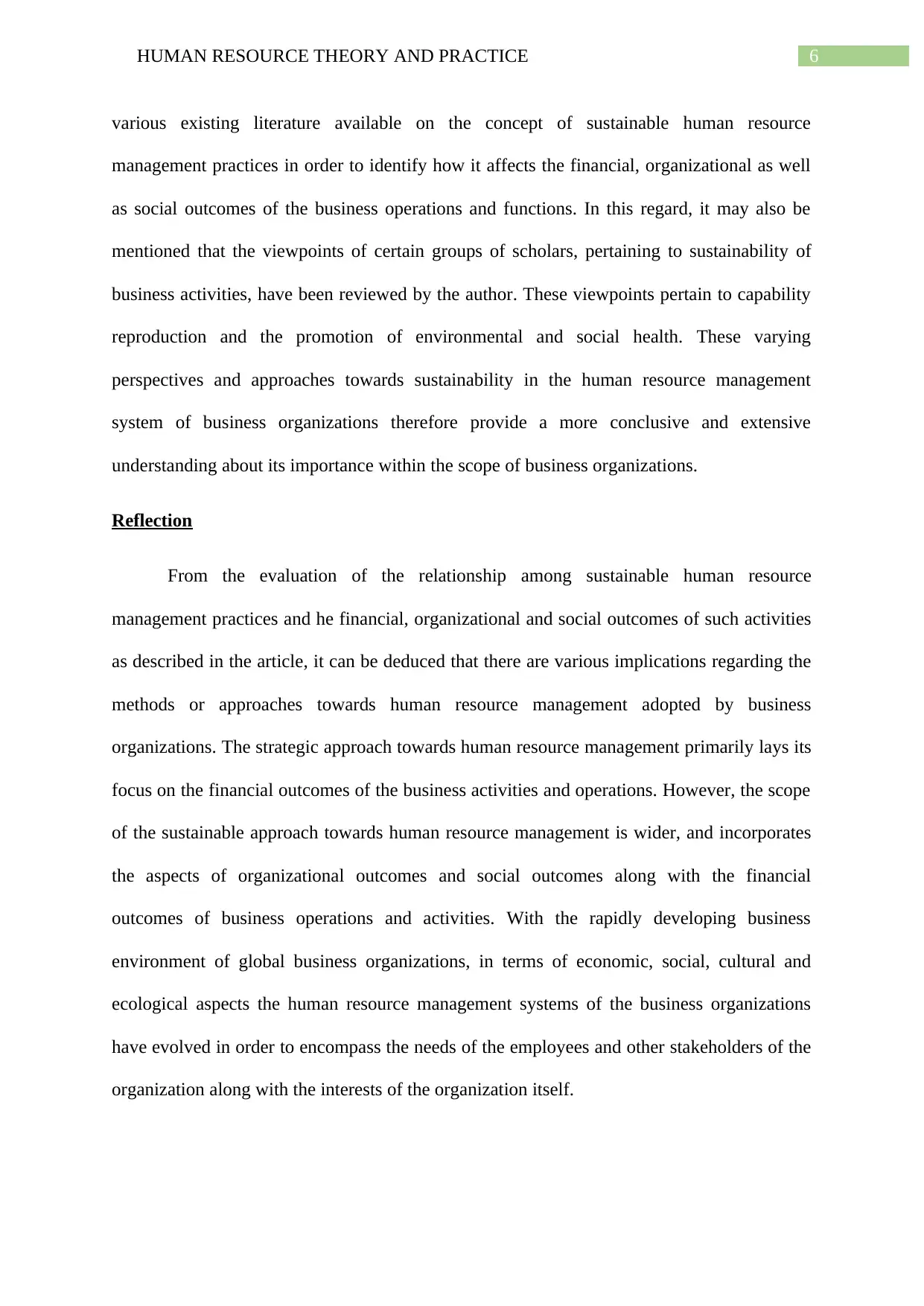
6HUMAN RESOURCE THEORY AND PRACTICE
various existing literature available on the concept of sustainable human resource
management practices in order to identify how it affects the financial, organizational as well
as social outcomes of the business operations and functions. In this regard, it may also be
mentioned that the viewpoints of certain groups of scholars, pertaining to sustainability of
business activities, have been reviewed by the author. These viewpoints pertain to capability
reproduction and the promotion of environmental and social health. These varying
perspectives and approaches towards sustainability in the human resource management
system of business organizations therefore provide a more conclusive and extensive
understanding about its importance within the scope of business organizations.
Reflection
From the evaluation of the relationship among sustainable human resource
management practices and he financial, organizational and social outcomes of such activities
as described in the article, it can be deduced that there are various implications regarding the
methods or approaches towards human resource management adopted by business
organizations. The strategic approach towards human resource management primarily lays its
focus on the financial outcomes of the business activities and operations. However, the scope
of the sustainable approach towards human resource management is wider, and incorporates
the aspects of organizational outcomes and social outcomes along with the financial
outcomes of business operations and activities. With the rapidly developing business
environment of global business organizations, in terms of economic, social, cultural and
ecological aspects the human resource management systems of the business organizations
have evolved in order to encompass the needs of the employees and other stakeholders of the
organization along with the interests of the organization itself.
various existing literature available on the concept of sustainable human resource
management practices in order to identify how it affects the financial, organizational as well
as social outcomes of the business operations and functions. In this regard, it may also be
mentioned that the viewpoints of certain groups of scholars, pertaining to sustainability of
business activities, have been reviewed by the author. These viewpoints pertain to capability
reproduction and the promotion of environmental and social health. These varying
perspectives and approaches towards sustainability in the human resource management
system of business organizations therefore provide a more conclusive and extensive
understanding about its importance within the scope of business organizations.
Reflection
From the evaluation of the relationship among sustainable human resource
management practices and he financial, organizational and social outcomes of such activities
as described in the article, it can be deduced that there are various implications regarding the
methods or approaches towards human resource management adopted by business
organizations. The strategic approach towards human resource management primarily lays its
focus on the financial outcomes of the business activities and operations. However, the scope
of the sustainable approach towards human resource management is wider, and incorporates
the aspects of organizational outcomes and social outcomes along with the financial
outcomes of business operations and activities. With the rapidly developing business
environment of global business organizations, in terms of economic, social, cultural and
ecological aspects the human resource management systems of the business organizations
have evolved in order to encompass the needs of the employees and other stakeholders of the
organization along with the interests of the organization itself.
Paraphrase This Document
Need a fresh take? Get an instant paraphrase of this document with our AI Paraphraser
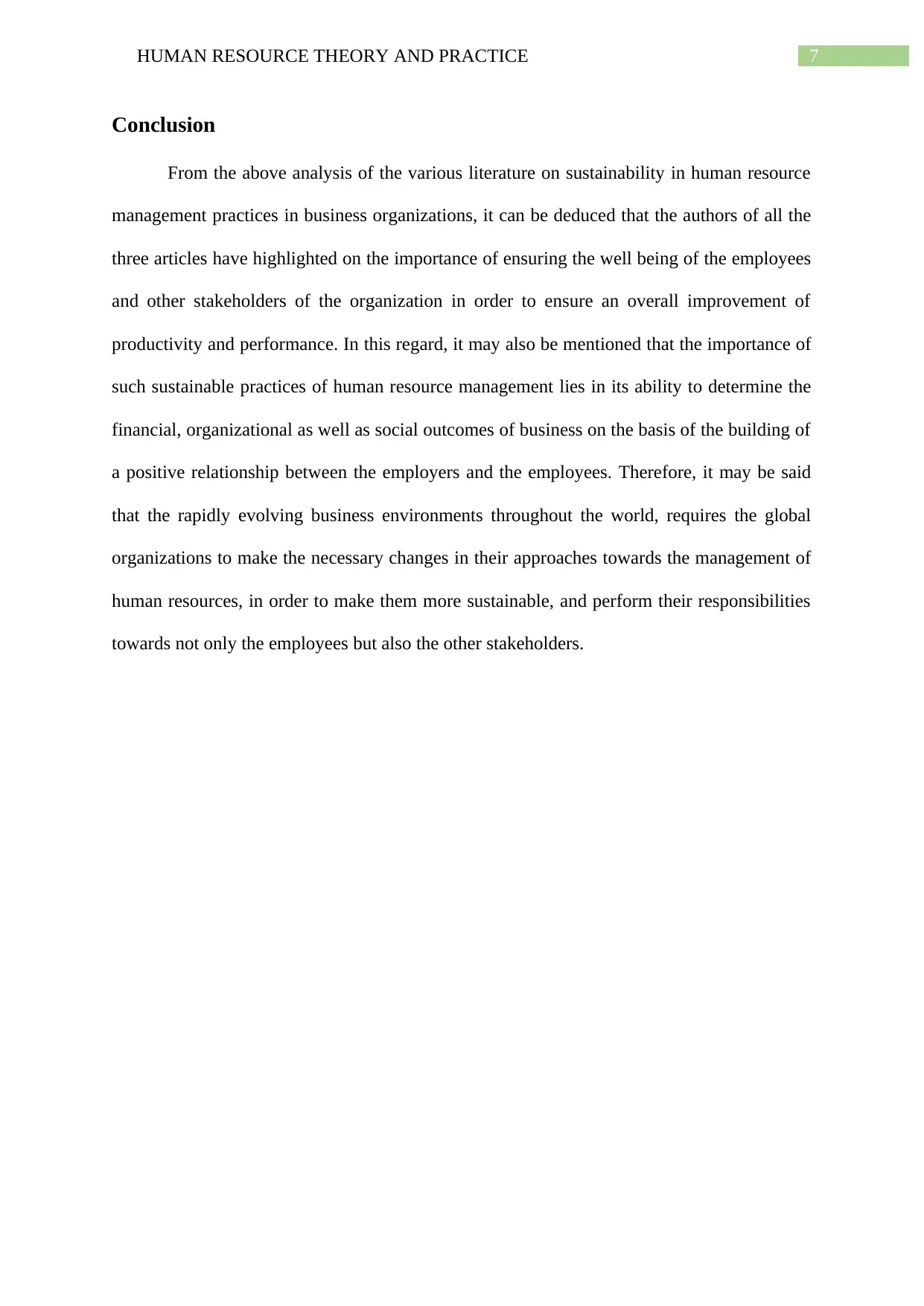
7HUMAN RESOURCE THEORY AND PRACTICE
Conclusion
From the above analysis of the various literature on sustainability in human resource
management practices in business organizations, it can be deduced that the authors of all the
three articles have highlighted on the importance of ensuring the well being of the employees
and other stakeholders of the organization in order to ensure an overall improvement of
productivity and performance. In this regard, it may also be mentioned that the importance of
such sustainable practices of human resource management lies in its ability to determine the
financial, organizational as well as social outcomes of business on the basis of the building of
a positive relationship between the employers and the employees. Therefore, it may be said
that the rapidly evolving business environments throughout the world, requires the global
organizations to make the necessary changes in their approaches towards the management of
human resources, in order to make them more sustainable, and perform their responsibilities
towards not only the employees but also the other stakeholders.
Conclusion
From the above analysis of the various literature on sustainability in human resource
management practices in business organizations, it can be deduced that the authors of all the
three articles have highlighted on the importance of ensuring the well being of the employees
and other stakeholders of the organization in order to ensure an overall improvement of
productivity and performance. In this regard, it may also be mentioned that the importance of
such sustainable practices of human resource management lies in its ability to determine the
financial, organizational as well as social outcomes of business on the basis of the building of
a positive relationship between the employers and the employees. Therefore, it may be said
that the rapidly evolving business environments throughout the world, requires the global
organizations to make the necessary changes in their approaches towards the management of
human resources, in order to make them more sustainable, and perform their responsibilities
towards not only the employees but also the other stakeholders.
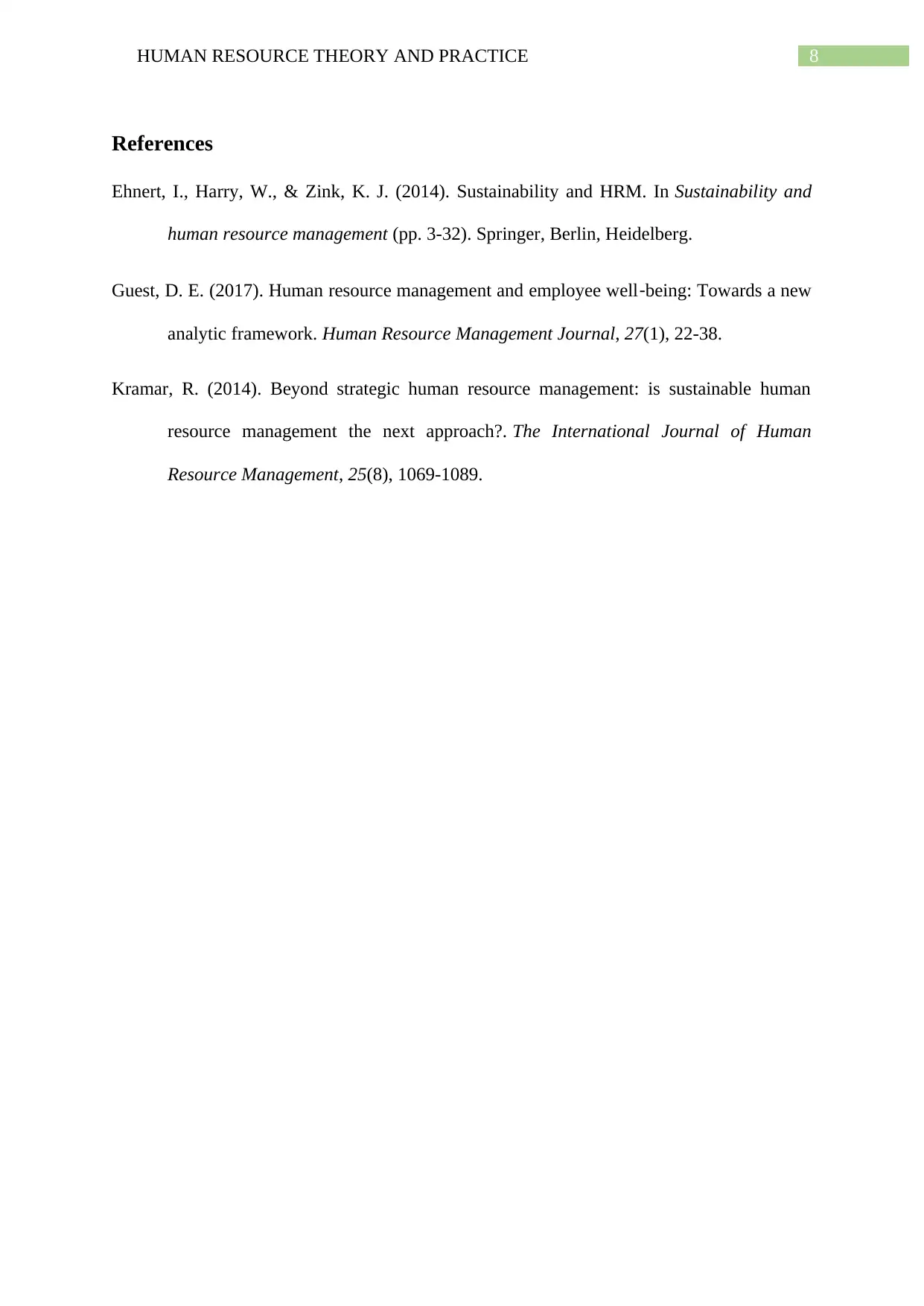
8HUMAN RESOURCE THEORY AND PRACTICE
References
Ehnert, I., Harry, W., & Zink, K. J. (2014). Sustainability and HRM. In Sustainability and
human resource management (pp. 3-32). Springer, Berlin, Heidelberg.
Guest, D. E. (2017). Human resource management and employee well‐being: Towards a new
analytic framework. Human Resource Management Journal, 27(1), 22-38.
Kramar, R. (2014). Beyond strategic human resource management: is sustainable human
resource management the next approach?. The International Journal of Human
Resource Management, 25(8), 1069-1089.
References
Ehnert, I., Harry, W., & Zink, K. J. (2014). Sustainability and HRM. In Sustainability and
human resource management (pp. 3-32). Springer, Berlin, Heidelberg.
Guest, D. E. (2017). Human resource management and employee well‐being: Towards a new
analytic framework. Human Resource Management Journal, 27(1), 22-38.
Kramar, R. (2014). Beyond strategic human resource management: is sustainable human
resource management the next approach?. The International Journal of Human
Resource Management, 25(8), 1069-1089.
⊘ This is a preview!⊘
Do you want full access?
Subscribe today to unlock all pages.

Trusted by 1+ million students worldwide
1 out of 9
Related Documents
Your All-in-One AI-Powered Toolkit for Academic Success.
+13062052269
info@desklib.com
Available 24*7 on WhatsApp / Email
![[object Object]](/_next/static/media/star-bottom.7253800d.svg)
Unlock your academic potential
Copyright © 2020–2026 A2Z Services. All Rights Reserved. Developed and managed by ZUCOL.




